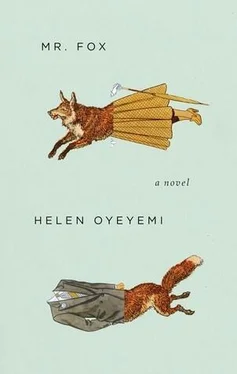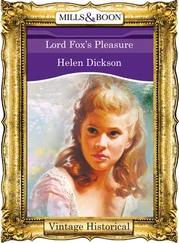I closed my eyes. Daphne didn’t move. I felt her weight a few inches away, warm and still. I opened my eyes again. She was looking at me and her smile had crumpled.
“What? Have we run out?”
“No.”
“What is it, D.?”
“You want me to? You want me to go and — you know?”
“You don’t want to.” I was alarmed, and I sounded alarmed. It wasn’t the thought of a baby, per se. It was just the sudden change; she might as well have pulled the mattress right out from under me.
She smiled. Falsely, brightly. She scrambled out of bed. “Okay. Thanks for letting me know how you feel.”
“D. Hold on. Hold on just a second—”
She vanished into the bathroom. I went up to the closed door and heard nothing. The taps didn’t turn on. She might have opened the cupboard and reached for the yellow bottle that sat between my razor and her set of heated curlers, but if she had, then she’d done it with infamous and unnecessary stealth. After a few more minutes I became convinced she’d climbed out of the window and run off into the night. I knocked on the door. “D.”
“Yes, darling.”
“Are you going to come out?”
“Yes, in a minute.”
There are things I should have said to her then, but I didn’t say any of them. I thought I’d tell her when she came out. She didn’t come out. She was still in there when I fell asleep. I woke up at some point before dawn and she was there in bed beside me, nestled up against me. She’d taken my arm and put it around her. And I was grateful. Pathetically grateful. Next time the matter came up, I would say the things I knew I should say.
Very early the next morning we walked down to Cloud Cove and walked out across the sand to the island; it was accessible on foot when the tide was out, and I wanted to show Daphne the lighthouse. I own it — I mean, I inherited it, and just like my father, who inherited it from his father, I don’t know what the hell to do with it so I just make sure it gets a good spring cleaning from top to bottom three times a year and keep some books there. My great-grandfather won the place in a game of cards. I always think I might go over there to work, but I never do.
Daphne and I didn’t talk much on the way over. We picked up bits of driftwood, shells, and pebbles, and arranged them on the ground when we felt we’d carried them too far away from where we’d picked them up. The wind nipped us through our clothes.
“Oh, God,” Daphne said, as the lighthouse came into view. She said “Oh, God” again and again with every step we took towards it. “It looks evil. ”
It wasn’t evil. It was just a white tower with long slits for windows. Not even a particularly tall tower. She liked it better when we were inside and she saw that it was spickand-span and modern. I took her up to the lantern room, and she stared at the lantern through the glass panels. It was the size of a man, and covered in dust. I pointed out the lenses that surrounded it, and explained how they refracted the light from the lantern and made it fly out in all directions the way she’d seen it in movies. When I took her to the watch room she insisted on turning the handles that rotated the lamp lenses. We heard the lenses whirring — not a comfortable sound to have above you — like huge wings flapping in place, but there was no kerosene in the lamp, and even if there had been, it was morning, so the whole thing was a pretty pointless exercise.
“You must have loved this place as a boy,” she said, as we came down the spiral staircase. “It must have been like a four-storey playground.” She’d brought some logbooks down with her, clutched against her chest, even though I’d warned her that all she’d find written there were times and dates and comings and goings and observations on what direction the wind was coming from.
“Not really,” I told her. “I didn’t see the point of it.”
“All right, well — normal kids would love it. . ”
She’d brought a flask full of coffee and some rolls, and we had those at the kitchen table. She looked over the logbooks, lost interest after about four pages, as I had predicted, but soldiered on. I left her at the table and went to go and pack up a few books I wanted. I dragged a couple of crates over to the back door, so I could look out at the sea while I searched — the tide was high and choppy, but not so that I couldn’t see across the cove. I looked from my books to the water, from my books to the water — sunlight flashed once, twice, three times on the waves. The fourth time I saw that it wasn’t light. It was a hand, raised up at the end of an arm, and it was waving at me. Gradually, Mary Foxe walked out of the sea and paced across the sand towards me. She wasn’t smiling. Her hands were behind her back. She looked as if she had a lot on her mind. Once she was standing directly before me, she dropped a curtsey.
“Mary.”
“Yes, Mr. Fox?”
“I think I know what we’re trying to do with this game of ours.”
“Tell me.”
“We’ve been trying to fall in love—”
She raised her eyebrows. “With each other?” she asked, coolly.
“Would you let me finish?”
“With pleasure.”
“We’ve been trying to fall in love — yes, with each other — but we’ve been trying to take some of the danger out of it. So no one ends up maimed, or dead. We’re trying for something normal and nice.”
Mary folded her arms. “That is not what we’re trying to do.”
“Oh. What, then?”
“Your wife loves you. Turn to her. Properly. Stop fobbing her off and being a counterfeit companion. It would be good if, after all this, just once you wrote something where people come together instead of falling apart. Just show me you can do it and I’ll leave you alone.”
“But I don’t want you to leave me alone.”
She turned to face the sea. The wind whipped her hair around. Her hair is a miraculous color, like autumn leaves shaken down around her shoulders. She looked wild and lovely.
“Mary. If you were real I’d run away with you forever.”
I went to her; we faced each other. She said, “You’re cruel, Mr. Fox.” Her voice, her eyes. She was weary.
My heart was doing that jerking thing it did when I’d thought Daphne might leave me, but worse. Much, much worse. Almost unbearable. I was about to go off like a bomb or something. It actually hurt.
(Please don’t let me keel over on the sand at this woman’s feet.)
“I would like to have breakfast with you,” Mary Foxe said. “And I would like to have you defer a little to my tastes and habits — at present I have none, because you haven’t given me any. I’d like to go to dinner parties with you and play charades. I’d like to have friends to lend me books and tell me secrets. I would like to have nothing to do with you for hours on end and then come back and find you, come back with things I’ve thought and found out all on my own — on my own, not through you. I’d like not to disappear when you’re not thinking about me.”
She enunciated her words very slowly and carefully. As she spoke I saw that I’d proposed the impossible.
“So if you did find some way for me to be real and for me to be together with you, then I wouldn’t mind that. I wouldn’t mind at all.”
“Honey,” Daphne called out. “Shouldn’t we go before it gets dark?”
Mary wasn’t there anymore. She’d never passed out of my sight so abruptly before.
I was shaken, and Daphne mustn’t know that I was shaken. I’d told her she had nothing to worry about where Mary was concerned. I’d said it wasn’t “like that.” Had I lied? To Daphne? Or just now, to Mary? I’ll say anything to get out of a spot. I counted to ten, holding my chest like a fool, like Young Werther guarding his sorrows; then I went to Daphne. She was sitting on the front steps with a paperback. It had to be War and Peace —it was thick enough. The title was in Cyrillic, and so were all the contents.
Читать дальше












